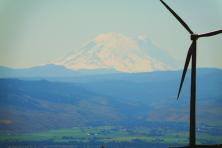New data from the Environmental Protection Agency lists Washington’s top greenhouse gas polluters, and show clearly where the state should focus pollution-reduction efforts.
It’s no surprise that coal and oil head the list—starting with the TransAlta coal-fired power plant in Centralia, already slated for closure. Four of the next five largest polluters are oil refineries. With so much of our state’s total greenhouse gas emissions coming from just a few sites, the EPA’s list shows that we have a ripe opportunity to make new investments in efficiency and pollution reduction. Making use of that opportunity is up to the Washington State Department of Ecology, which is currently considering a new set of rules limiting refinery emissions.
The new rules, adopted due to the hard work of Washington Environmental Council and the Sierra Club, are some of the first of their kind. Their structure and effectiveness will be crucial for setting an example for other states, especially given big oil’s propensity to play fast and loose with anti-pollution laws. Ecology’s rules are supposed to make sure the refineries are meeting a standard of the “lowest emission limit” given the “reasonably available control technology.” Unfortunately, the rules proposed by Ecology are rather unreasonable for the climate.
Ecology has said that a refinery is doing a great job as long as it falls within the top 50th percentile of all similarly sized refineries in the US for energy efficiency, as determined by secret data from an oil and gas consulting firm. Seriously – officials at the Department of Ecology don’t even have access to the data, which is self-reported by participating refineries. This is like telling a student with a history of cheating that they are awarded an “A” as long as they score in the top 50% of their class as determined by their friends test scores, which are self-reported while the teacher is out of the room. Needless to say, there is not much there to compel emissions reductions, and in some cases, refineries could even increase their emissions while remaining compliant.
Under the alternative compliance requirements, refineries would cobble together projects over ten years that result in a cumulative 10% reduction in emissions from a 2006 baseline. A 2006 baseline would be fine if it were 2007, but after nearly a decade it’s time to use some recent data. Washington’s refineries, some of which date back in the 1950s, have lots of room for increased efficiencies – many of which will surely result in financial savings as well. If oil companies were so hard strapped to find a measly 1% per year in efficiency savings, they should be able to meet a percentile requirement stricter than “average.”
Washington’s largest refineries, the state’s largest polluters, are also some of the state’s most profitable corporations. BP, Shell, and ConocoPhillips together pulled in nearly $50 billion in profit in 2012, and even Tesoro, the smallest of the big four cleared nearly $800 million. They have the money to invest in their facilities, install pollution control measures and increase their efficiency. The Department of Ecology must correct the rules to ensure that Washington’s refineries are among the most efficient in the United States, if not the world.



